Lynch School’s Goodman to Lead Woods College
BY JACK DUNN ASSOCIATE VICE PRESIDENT FOR UNIVERSITY COMMUNICATIONS
Boston College has named David Goodman, associate dean for strategic initiatives and external relations in the Lynch School of Education and Human Development, as dean of the Woods College of Advancing Studies, effective August 1. He succeeds former dean Karen Muncaster, who retired in December.
Prior to working in the Lynch School as associate dean and director of the Center for Psychological Humanities and Ethics, Goodman served as associate dean of academic affairs and advising at Woods College from 2014-2018, and interim dean from 2018-2019.
A highly respected clinical psychologist, administrator, and faculty member who has taught at the Woods College, Lynch School, and Morrissey College of Arts and Sciences, as well as Lesley University, Regis College, Harvard Medical School, and Azusa Pacific University in California, Goodman brings to the position a clear understanding of Woods College’s distinctiveness and a desire to enhance and expand its academic programs to meet the ever-evolving needs of non-traditional students.
Provost and Dean of Faculties David Quigley cited Goodman’s extensive administrative experience and strategic vision in continuing and professional studies as key strengths that will assist him in leading the Woods College as dean.
BC Lands a Spot in the Forbes ‘New Ivies’ List
BY PHIL GLOUDEMANS STAFF WRITER
The Ivy League is forfeiting its standing as America’s producer of great talent, while a cohort of ascendant public and private universities, including Boston College, is emerging as the academic institutions employers rely on for new hires, according to Forbes’ listing of the “New Ivies,” published April 29.
Based on its research, Forbes, the century-old national business magazine, reported that American companies are not only souring on hiring Ivy League graduates, but also prefer the hardworking, highachieving graduates from the 20 prominent American universities that comprise their list.
Boston College heads the Forbes list of 10 private universities—a second list includes public institutions—that are “turning out the smart, driven graduates craved by employers of all types,” while “the Ivies are more apt to turn out entitled ones,” according to the magazine.
Joining BC in the private school “New Ivies” listing are Carnegie Mellon University, Emory University, Georgetown University, Johns Hopkins University, Northwestern University, Rice University, University of Notre Dame, University of Southern
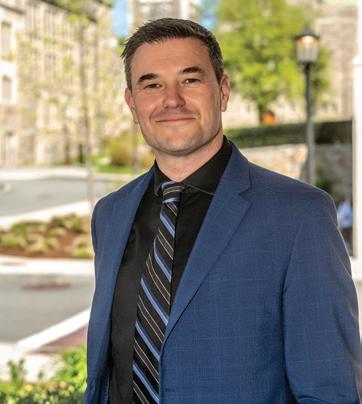
“David Goodman possesses a deep knowledge of the Woods College, and he is passionate about its students and programs,” said Quigley. “He has articulated a compelling vision for its future, and I look forward to working closely with him as he moves back to St. Mary’s Hall South [the location of Woods College].”
Goodman said he was pleased to assume the Woods deanship and to build on the strength and momentum that exists within the school.
“After joining the Woods College as an administrator and teacher, I became enamored with Woods’s students, its mission, and its commitment to providing life-changing education for adult learners,” said Goodman.
“The stories that come out of St. Mary’s Hall South are some of the most inspiring I have ever heard. They are stories of compassion, dedication, and resilience in the face of adversity. It is an honor to play a small role in those stories and, after being away for the past five years while working with my wonderful colleagues at the Lynch School, I am overjoyed to return to the Woods community as dean. It is a true homecoming, one for which I am deeply grateful and incredibly excited.”
While interim dean at the Woods College, Goodman developed programmatic offerings that capitalized on staff strengths and market needs to serve students in undergraduate, graduate, certificate, professional development, and executive education programs. He also developed successful strategies for creating online courses and degree opportunities in collaboration
Continued on page 3
California, and Vanderbilt University.
“Forbes’ ‘New Ivies’ listing is an external validation of the quality of our students and their ability to use their liberal arts education to become leaders and solve problems in an increasingly complex world,” said Dean of Undergraduate Admission and Financial Aid Grant Gosselin. “It’s a quality that is in demand among hiring leaders.”
“We are thrilled to be recognized by Forbes as one of the ‘New Ivies,’” added Associate Vice President for Career Services
Continued on page 7
INSIDE
2 A Look Back
New website on Black history at BC Law is launched.
3 Bellarmine Award
‘University citizen’ Joseph Quinn to be honored at Commencement.
8 BC Research
Trio researches relationship between pot legalization and teen substance abuse.

“I remember when nobody knew or understood what ALS was,” says John West ’24 (left). “Then all of a sudden, Pete Frates comes out with the Ice Bucket Challenge with Pat Quinn and now everyone in the world knows what ALS is. It’s incredible.”
Eagles Senior Named as Captain of a Special Team
BY AUDREY LOYACK STAFF WRITER
It had already been a memorable February weekend for Boston College pitcher John West ’24. Then it got even better. Starting his last season with BC baseball, West and his teammates were in Arizona preparing to play their second game of the MLB Desert Invitational Tournament. Before the game, he was introduced to Jon “Boog’’ Sciambi ’92, TV announcer for the Chicago Cubs and a leading figure in the fight against ALS, also known as
Lou Gehrig’s disease.
That was when BC baseball coaches Todd Interdonato and Greg Sullivan told West he had been named to the inaugural Lou Gehrig Community Impact Team, which honors nine collegiate baseball players for community service and philanthropy, contributions to the success of their respective teams, and embodying the spirit and character of the fabled Gehrig. There was more: Because he’d received the most votes of the nine, West had earned the title of Community Impact
Continued on page 8
MAY 9, 2024 VOL. 31 NO. 17
PUBLISHED BY THE BOSTON COLLEGE OFFICE OF UNIVERSITY COMMUNICATIONS
David Goodman
photo by lee pellegrini
New Website Highlights Black History at BC Law
BY PHIL GLOUDEMANS STAFF WRITER
A renowned scholar, a cherished mentor to generations of students, and an influential member of the greater Boston legal community, Ruth-Arlene W. Howe J.D. ’74 arrived at Boston College Law School in 1970 as one of its very few female African American students. Twenty-seven years later, she became the first Black woman to earn tenure and the rank of full professor in the school’s history.
Her story, along with those of many past and recent Black BC Law graduates are told on the school’s new website, “Black History at BC Law.” Launched in April to honor, document, and celebrate the rich history of contributions from Black BC Law community members as student leaders, educators, academics, judges, activists, litigators, transactional attorneys, and visionaries, the site precedes this year’s historic graduation of the school’s largest class of 40 Black students.
“This was such an ambitious and important project,” said Odette Lienau, the Marianne D. Short, Esq., Dean of BC Law. “Much of our Black alumni’s history was comprised within Ruth-Arlene Howe’s own materials and her memory. We wanted to help preserve the archives and celebrate the many accomplishments of our Black community.
“As we prepare to graduate the largest class of Black students ever, this year seemed to be a particularly appropriate time to do so.”
The site features 10 videotaped interviews with Black BC Law graduates, conducted in fall 2023, that chronicle the speakers’ thoughts on Howe’s legacy, their own experiences as Black law students and alumni, and what the Black Law Students Association (BLSA) and the Black Alumni Network (BAN) meant to them.
“This is the opportunity to ensure that this history, that I’ve been part of, is available for people in the future, because what we hope that has been put in place is a firm foundation,” said Howe, a BAN co-founder who retired from active teaching duties in 2009 and is now a professor emerita. Her private papers will be permanently archived at the University.
“Black History at BC Law” includes such compelling stories as that of legal pioneer Harold A. Stevens J.D.’36. The first African American graduate of BC Law was also the first African American judge to sit on the New York State Court of Appeals in its 177-year history. Motivated by the
ASSOCIATE VICE PRESIDENT FOR UNIVERSITY COMMUNICATIONS
Jack Dunn
SENIOR DIRECTOR FOR UNIVERSITY COMMUNICATIONS
Patricia Delaney
EDITOR Sean Smith
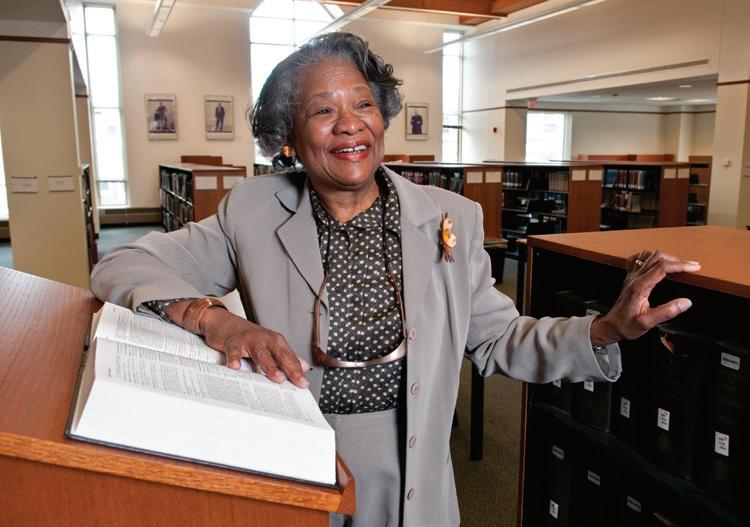
of 2023, followed by the gradual release of nine other extended interviews with Black alumni and students. The collection includes a detailed history, timeline, additional videos and photos, alumni profiles, articles from the BC Law Magazine and Alledger—a BC Law student newspaper that was published from 1981 to the mid1990s—and more.
“Alumni are thrilled to see this commitment from the institution, and current students are excited,” said Assistant Dean for Diversity, Equity, and Inclusion Lisa Brathwaite, who collaborated with Kenyon, administrators, students, and members of the Black Alumni Board. “It gives a home and visibility to the Black experience at BC Law, and the rich traditions and foundations current members are continuing to build on. Personally, I am delighted and grateful to play a role in preserving and celebrating this history, particularly as we look ahead to the school’s centennial in 2029.”
Brathwaite noted that the school is actively seeking alumni participation to update the present information.
lynching of a Black woman and her brothers in his South Carolina hometown, Stevens was determined to study law and use the legal system to eliminate racial injustice. He enrolled at BC Law in 1933 after the University of South Carolina rejected him due to its segregationist policies.
The “Black History at BC Law” project was a year in the making, noted Nate Kenyon, director of marketing and communications and senior advisor to the dean at BC Law.
“BLSA and BAN had been advocating for support around archiving their organizational histories for some time,” he said.
BC Scenes
Looking for Adventure
The Theatre Department/Robsham Theater Arts Center closed out its 2023-2024 season last month with a production of Qui Nguyen’s “She Kills Monsters,” directed by Associate Professor of Theatre Courtney Elkin Mohler.
CONTRIBUTING STAFF
Phil Gloudemans
Ed Hayward
Audrey Loyack
Rosanne Pellegrini Kathleen Sullivan
PHOTOGRAPHERS
Caitlin Cunningham Lee Pellegrini
“Shortly after she arrived, Dean Lienau formed a team of researchers, administrators, and videographers to tackle the project. The group came up with an ambitious proposal: The first part centered on a video featuring Ruth-Arlene Howe; the second part was the creation of a website dedicated to Black history at the school.”
The team formed an advisory group of BLSA and BAN members, reviewed school archives, visited Howe at her Utah home to scan documents, recorded oral histories, interviewed Black students and alumni, gathered photos, and developed site content.
Howe’s video was introduced in the fall
“We’re eager to receive more photos and additional material for the timeline. We truly want this site to be as reflective as possible of the breadth of experience, the strength of community, and the diversity of career trajectories that this community brings to the legal profession,” she said.
“I’m very grateful for the hard work of the BC Law team and advisory group in pulling all this impressive content together and making it accessible to all,” said Lineau.
The website is at bc.edu/content/bc-web/ schools/law/sites/bclaw-black-history.html

The Boston College Chronicle (USPS 009491), the internal newspaper for faculty and staff, is published biweekly from September to May by Boston College, with editorial offices at the Office of University Communications, 3 Lake Street, Brighton, MA 02135 (617)552-3350.
Distributed free to faculty and staff offices and other locations on campus.
Periodicals postage paid at Boston, MA and additional mailing offices.
POSTMASTER: send address changes to The Boston College Chronicle, Office of University Communications, 3 Lake Street, Brighton, MA 02135.
A flipbook edition of Chronicle is available via e-mail.
Send requests to chronicle@bc.edu.
May 9, 2024
www.bc.edu/bcnews chronicle@bc.edu Chronicle
Professor Emerita Ruth-Arlene Howe J.D. ’74 is among the Black Boston College Law School graduates featured on the “Black History at BC Law” website.
photo by lee pellegrini
2 Chronicle
photo by lee pellegrini
A Grateful Quinn Will Receive Bellarmine Award
BY ROSANNE PELLEGRINI STAFF WRITER
Professor of Economics Joseph Quinn, a leading expert on Social Security and retirement, and a highly respected teacher, mentor, and colleague who has held key leadership positions at Boston College is this year’s recipient of BC’s Saint Robert Bellarmine, S.J., Award.
Presented at Commencement by University President William P. Leahy, S.J., the award recognizes a distinguished faculty member whose significant contributions have consistently and purposefully advanced the mission of Boston College. It is named for Saint Robert Bellarmine, S.J., an Italian cardinal and one of the leading figures in the Counter-Reformation.
Quinn “is an important scholar of the economics of retirement, and has been a great University citizen across the entire modern history of Boston College,” said Provost and Dean of Faculties David Quigley, praising Quinn’s 50 years of service to BC.
Quigley also commended Quinn’s “outsized contributions” to Boston College and said the University is a “far better, more humane place” because of them.
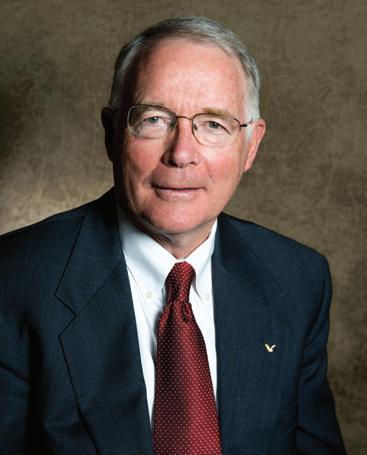
Leahy and J. Donald Monan, S.J.] during my five decades here, and I have enjoyed 40 years as a teacher and researcher in Economics, and nine years in the administration: eight as dean of the College of Arts and Sciences—which I loved—and one as interim provost.”
During his long tenure, Quinn also served as Economics Department chair, was the James P. McIntyre Professor of Economics, and the inaugural NCAA Faculty Athletics Representative and chair of the Boston College Athletics Advisory Board.
He has written on the economics of aging, the determinants of individual retirement decisions, recent trends in the retirement patterns of older Americans, and Social Security reform. Quinn co-chaired the Technical Panel on Trends and Issues in Retirement Savings for President Clinton’s 1996 Social Security Advisory Council.
has held leadership positions. Quinn received a doctoral degree from the Massachusetts Institute of Technology and a bachelor’s degree from Amherst College, where he recently served as a member of its board of trustees.
“Whatever contributions I have made during my time at Boston College, I have received so much more in return,” Quinn said. “I came here from the graduate economics program at MIT, expecting to stay for two years, and I am still here nearly 50 years later!
“Boston College is a happy place, and I am so grateful to have spent my professional life here. Thanks to all who made this such a rewarding experience,” he added.
Quinn said, “I have loved my time here, interacting with bright undergraduate and graduate students, wonderful colleagues in the Economics Department and across the University, and excellent administrators who lead this great University.
“We have had two terrific presidents [Fr.
Goodman New Woods Dean
Continued from page 1 with campus partners. As associate dean, he helped to launch new graduate programs, vastly expanded online and hybrid course development, and improved academic advising and student support initiatives for Woods students.
More recently, as associate dean in the Lynch School, he worked closely with Charles F. Donovan, S.J., Dean Stanton Wortham to develop and implement a strategic plan for the school and provide innovation leadership in establishing new programs—from online courses to professional development opportunities.
“The future of the Woods College is exceptionally bright,” said Goodman. “It is my hope that the school will soon be recognized as an academic ‘maker space’ on campus—providing an innovative and collegial environment in which faculty and students are invited to explore new programmatic opportunities and modalities. In today’s ever-shifting higher education landscape, it is critical for the University to have a space dedicated to cross-institutional initiatives and partnerships.
“One of the hallmarks of the Woods College is its cross-professional and interdisciplinary approach to continuing and professional education. Woods is thus wellequipped to work with other schools on campus to develop substantive, engaging, and meaningful collaborations that will benefit current and future students alike. I truly believe the Woods College can and will become the premier continuing and professional studies school in the Jesuit network.”
A graduate of Azusa Pacific University, Goodman received a master’s degree in theology from Fuller Theological Seminary,
and a master of arts degree in clinical psychology and a doctor of philosophy degree in clinical psychology from Fuller Graduate School of Psychology. He is the author of multiple scholarly books and journal articles and has done extensive editorial work, including overseeing two book series: Psychology and the Other and Essays in the Psychological Humanities, which highlight creative work at the intersections between psychology and the disciplines relevant to the human psyche.
He is past president of the American Psychological Association’s Division 24, and the Society for Theoretical & Philosophical Psychology. He and his wife Katie are the parents of Levi, Sienna, Eva, and Joshua, and enjoy cooking with family and friends, discovering new cuisines, and exploring new places domestically and internationally.
“When I joined the Boston College community 10 years ago, I could not have imagined the ways my life would be transformed by the University’s mission and ethos,” said Goodman. “During the past decade, I have grown intellectually, morally, and most importantly, spiritually, and that growth can be attributed in large part to the relationships I have formed as a member of the BC family. This institution is truly a formative place and I feel humbled and honored to serve in a leadership role at such a remarkable University.”
Quigley thanked Interim Dean Akua Sarr for her efforts in leading the school during its leadership transition.
“The Woods College community, and all of us at Boston College, have benefited from Akua Sarr’s tenure as interim dean this semester,” said Quigley. “I am grateful for her service.”
Quinn co-authored the books Passing the Torch: The Influence of Economic Incentives on Work and Retirement and The Economics of an Aging Society, and has written more than 100 journal articles, monographs, and book chapters. A popular and respected professor, he has taught at the undergraduate and graduate levels.
He also is a founding member of the National Academy of Social Insurance, where he
Quinn “has done just about every job on the Chestnut Hill Campus and seems to know almost everyone,” Quigley said. “It’s no accident that the modern trajectory of Boston College’s rise from near bankruptcy to national recognition as one of America’s great research universities has coincided almost precisely with Joe’s tenure in the Economics Department.”
Previous recipients of the Bellarmine Award are Thomas F. Rattigan Professor of English Mary Crane, Professor of Philosophy Patrick Byrne, Professor and Biology Chair Welkin Johnson, and Lynch School of Education and Human Development Professor Emerita Mary Walsh.
Muñiz Earns Early-Career Honor
Raquel Muñiz, an assistant professor in the Lynch School of Education and Human Development, was recently selected as a recipient of a William T. Grant Foundation Scholar Award, an annual program that supports career development for promising, early-career researchers. She was one of 50 applicants for the grant.
Each year, four to six scholars are selected by the foundation for funding over a five-year period to expand their expertise. Launched in 1982, the award includes a mentoring component designed to assist the scholars in taking measured risks in their trajectories as researchers.
Muñiz joined the Lynch School’s Department of Educational Leadership and Higher Education in 2018; she also has a courtesy appointment at the Boston College Law School. Her research is grounded in the examination of oppressive power structures and the strategies to disrupt them in education. Through this racial equitycentered work, she seeks to inform educational equity discourse and scholarship.
“I’m excited to join the 2029 William T. Grant Scholars Program class, and the supportive community of scholars and mentors who will enable my professional growth,” said Muñiz, who holds law and education doctoral degrees from Pennsylvania State University. “Through the research project, I will have an opportunity to study how social networks shape education attorneys’ use of research in service of marginalized youth, and to learn from dedicated education advocates. The goal is to inform how we can improve the use of research in law to advance equity.”
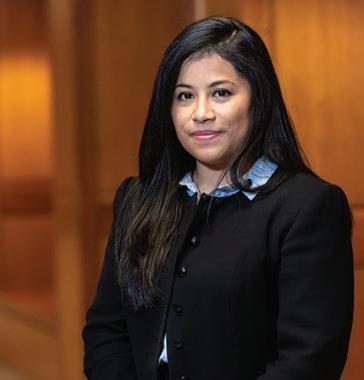
“We are thrilled that our colleague Raquel Muñiz has won a W.T. Grant Scholar Award,” said Stanton E. F. Wortham, the Charles F. Donovan, S.J., Dean of the Lynch School. “The awards are extremely competitive, and it’s very impressive that she succeeded in the first year she applied. This support will allow her to expand her important work in law and education, and we look forward to the results in the years to come.”
The William T. Grant Foundation, founded in 1936, is an American nonprofit philanthropic organization that funds research in the social sciences, with a particular focus on reducing inequality in youth outcomes and improving the use of research evidence in public policy and practice settings.
—Phil Gloudemans
May 9, 2024
Joseph Quinn
photo by lee pellegrini
Raquel Muñiz
photo by lee pellegrini
3 Chronicle
SENIORS TO REMEMBER
Oluchi Ota
Connell School of Nursing
Hometown: Vineland, NJ
Notable Activities/Achievements: Student board member, Schiller Institute for Integrated Science and Society; delegate, COP27; treasurer, Bioethics Society of Boston College; student representative, University Committee on Core Renewal; studied abroad at Australian Catholic University, Melbourne; patient care associate, Newton-Wellesley Hospital.
Mentors: Colleen Simonelli and Anya Villatoro (CSON); alumna Celia Jotte ’22.
Post-Graduation Plans: Will take the NCLEX licensure exam this summer and hopes to work in New York as a labor and delivery nurse and, ultimately, as a midwife.
When Oluchi Ota graduates on May 20, one of the people cheering her on in Alumni Stadium will be the labor and delivery nurse who helped to bring her into the world. Ota’s mother Amanda Ota forged a close bond with the labor and delivery nurse who cared for her during her labor with her daughter. The bond was so profound that the nurse was chosen to be Ota’s godmother. Ota’s choice to pursue a career as a labor and delivery nurse is inspired by the connection her godmother made with Amanda. Ota is specifically interested in the impact environmental factors can have on maternal health—from prenatal to post-partum.
What was your favorite clinical experience as a nursing student?
It would have to be my general maternity clinical at Boston Medical Center. I loved the patient population at Boston Medical. It was a high immigrant population. My mom is from South Africa and my dad is Nigerian. It was my first time having so many
Margaret (Molly) Breen Mitchell
Lynch School of Education and Human Development
Hometown: Columbus, Ohio
Majors: Secondary Education and English Notable Activities/Achievements: Ascend program leader; Halftime program leader; Laughing Medusa editor; BC Student Admission Program.
Mentors: Grace Roberts (Center for Student Formation); Julia DeVoy (Lynch School); Emily Rayball and Chris Darcy (First Year Experience); Owen Grover and Chris O’Brien (Undergraduate Admission).
Post-Graduation Plans: English teacher in middle or high school, either in Greater Boston or Cincinnati.
A deep believer in and practitioner of cura personalis—the fundamental Jesuit value of care of the whole person—Mitchell came to BC because of its humanistic values and programs, and while here, fully committed herself to initiatives that assisted students in their college transitions. She will leave campus as an even more profound disciple of the belief that human beings are the planet’s most important entity. As one of her mentors declared, she’s “one of the most genuinely kind people; she’s always mentoring younger BC students.”
patients that were of a similar identity as me, so it felt a lot more personal.
Because they understand their patient population, Boston Medical has a different approach to care and they’re known for doing that very well. It was nice to learn under that kind of institution. One of my last days, I met a Nigerian family from the same tribe as me. Their midwife and the physician were from the same tribe, too. We were in the room together playing music from Nigeria as the mother was pushing. It was a really beautiful labor progression.
You served as a delegate to the United Nations Climate Change Conference in Egypt (COP27). What was that experience like?
I took a class called Environment and Public Health with Kumar Praveen. He attended COP26 in the U.K. and shared his experiences with the class. It sounded so amazing that when the applications came out to attend COP27, I knew I wanted to try for it. The conference was great. You learn about how the world functions and the different social factors that influence decisions that people in power make. There was a lot of discussion about equity and inclusion and the balance of powers. The UN is supposed to be an equalizer, but even in that setting you could see that certain countries had money they could invest in big pavilions and lower-income countries had smaller pavilions that got less traction and had fewer people staffing them. Funding affects representation. As a BC student, I felt a great privilege being there. It’s unfortunate that so many students from other countries that deserve to be there weren’t there.
In terms of climate anxiety, it was over-
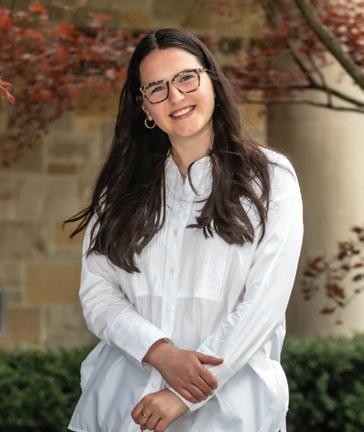
What drew you to BC and how has Boston College made a difference in your life?
In my very first Lynch School meeting, Julia DeVoy introduced our class to the school by describing it as a place full of “the most human-centric people you’ll ever meet.” The idea of being around these human-centric people is why I chose BC. I had heard stories about PULSE and Appa [Appalachian Volunteers], and how BC students went above and beyond for the world outside of Chestnut Hill. Immedi-
Members of the Class of 2024 talk about their Boston College experience
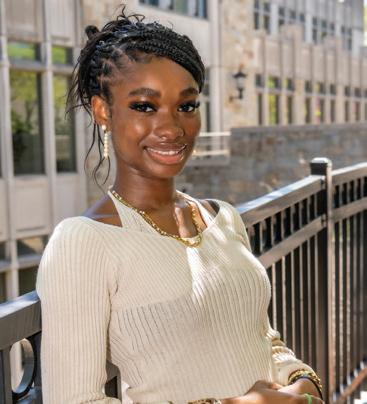
whelming. You see slow progression or no progression in some areas. It was definitely a lot to sit with after coming back.
How did attending COP27 lead to your involvement in the Schiller Institute for Integrated Science and Society?
After COP27, I did some debriefing programming sponsored by Schiller. Schiller reached out about joining a student board they were developing. Schiller’s always very open to listening to what students have to say and then working on how they can do things better. For COP, for example, you take a one-credit course before you go. So as a member of the student board, I got to give feedback so the course could be even better for the next students who go to COP.
Another neat thing that Schiller does is that they have their student board members participate in new faculty interviews. When there’s a new hire, there’ll be signups for the Schiller board students to have
ately after my first visit, I thought, “Sign me up!”
I would come to learn over the next four years that these human-centric people would go above and beyond for the humans next to them, too. At every turn, there have been people on this campus who define a new standard for compassion and connection: professors who required one-on-one “check in” meetings over coffee; deans who reached out to wish you a happy Thanksgiving; and roommates who would accompany you to karaoke parties on your best days and offer hand-written notes of encouragement on your worst. My time at BC has cemented my own identity as a human-centric person. I look forward to a life of big and small acts of service and solidarity.
What experiences at BC had the most significant impact on you?
The Ascend program for first-year women has been pivotal to my belonging at Boston College. Ascend gave me a group of women to listen to and laugh with amidst a pandemic-ridden freshman year that felt isolating and downright sad. In my junior and senior years, I led Ascend with that mindset. By planning events in my apartment, I hoped to give first-year
lunch with them. It gives us a chance to ask the new faculty questions and hear what they do and what they’ll bring to BC. And then they also ask us what we’ve been working on, so they can understand what BC is about and see what they could put in their coursework. It’s one of the most exciting things that we do as student board members. Schiller continuously makes us feel like we are being heard and are a part of the change that Schiller wants to make.
What will you miss most after graduation?
I went to a boarding school before BC. So I’ve been used to living on a campus for almost half of my life. I’m going to miss that ease of being able to find community just with those that I’m learning with and also learning from them. I’m hit with the reality that I will not always be a door down from my close friend. It’s also the little things. When I walk to class now, smiling faces, pleasant exchanges, or random walk-ins at the elevator can just help you get through your day. You’re not necessarily going to have that when you leave here, especially in a city.
But I know that BC has been a really good exercise in learning how to build community, even if it’s not still under the structure of an academic institution. I think that the relationships that I’ve been able to form here have really made me feel confident that once I do go out into these more unpredictable and vulnerable spaces, I’ll still be able to stand up on my own two feet and say and understand what I want from the people around me and curate another community for myself.
—Kathleen Sullivan
students a place where their words were validated and their stomachs were full and their hearts were warm. I was tired of an advice-disguised narrative I kept hearing of “just get through your first year and then college will be fun.” Why can’t we make freshman year fun?
After every meeting, I feel confident that the space Ascend has built—of fun and thoughtful reflection—matters to the 12 women in the room. I am so glad that each of them know they have us continually rooting for them throughout their time at BC.
I also worked as an orientation leader with First Year Experience. Supporting “first-years” through an important transition gave me an appreciation for all the people who make BC a home for those around them.
What will you miss most about BC?
The friendly faces. I love that there’s always someone to say “Hi!’ to on my walk home. I’ll miss those little moments of connection—being stopped by professors from last year to check in, waving to classmates or coworkers, and bear-hugging friends who just got back from abroad.
—Phil Gloudemans
May 9, 2024
Full profiles at: bit.ly/BC-Seniors-2024 4 Chronicle
Dylan Breen
Carroll School of Management
Hometown: Westford, Mass.
Majors: Finance and Entrepreneurship (coconcentration)
Notable Activities/Achievements: Co-director and member, Jenks Leadership Program; student leader and member, Arrupe International Encounters program; Ever to Excel Award recipient; CSOM Award Recipient; Connell Recreation Center student employee.
Mentors: Monetta Edwards (Winston Center for Leadership and Ethics), Michael Serazio (Communication), Emily Egan (Campus Ministry), Kristie Dickinson, Lyndon Garrett (CSOM), Jess Hartley (CSOM Career Services).
Post-Graduation Plans: Financial services industry
In some ways, Breen’s growth as a person and a leader was shaped by the things that didn’t go as planned. In 2022, his Arrupe international immersion trip to Mexico shifted to El Salvador because of a COVID-19 surge. This past January, Breen was a leader of the group’s trip to Quito, Ecuador, which was cut short when the country experienced outbursts of political and street violence; BC and United States officials ensured the group was able to return safely to the U.S. The experiences have become fixtures of a philosophy he’s glad to pass on to first-year students. “Everything that hasn’t gone as planned has been so impactful to my college experience.”
What was your most influential academic experience?
Design Thinking with Professor Kristie Dickinson was the most unique course
Jonah Kotzen
Morrissey College of Arts and Sciences
Hometown: West Palm Beach, Fla.
Majors: Biology and Classical Studies
Notable Activities/Achievements: Undergraduate Government of BC president (2023-2024), various leadership roles (2020-2023); founder of Classics Club; co-chair, Residence Hall Association Student Programming Council; teaching assistant, Ecology & Evolution; research assistant in lab of Biology faculty member Christopher Kenaley; leader, Halftime and 48 Hours retreats; active in BC’s Hillel chapter and Jewish community on campus; co-founder of the Reading Independence Program (BCP Reads); 2023 Homecoming Court.
Mentors: Christopher Kenaley, Jeff DaCosta (Biology); Holly Deak (Chemistry); Mark Thatcher, Hanne Eisenfeld, Kendra Eshleman (Classical Studies); Colleen Dallavalle, Shawna Cooper Whitehead (Student Affairs); Rory Stein (Disability Services); Roatha Kong (Student Involvement); Matt Razek, Chris Darcy, Philip Lee (First Year Experience); Andrew Basler (Center for Student Formation); Jeannine Kremer (Center for Student Wellness); Ira Kirschner (Bowman AHANA Intercultural Center); Jamie DiLoreto (Athletics).
Post-Graduation Plans: Advancing his knowledge in organismal biology and ecology through targeted fieldwork and research; plans to further this expertise by pursuing graduate studies in evolutionary biology (Ph.D.), medicine (M.D.), or a combination of both disciplines.
Known for his warm, engaging personality, Kotzen has immersed himself in a dynamic
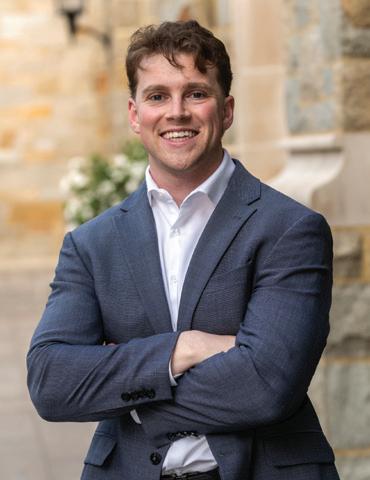
I’ve ever taken. It involved a lot of creative thinking. Our final project asked us to use design thinking principles to improve something you’re involved with at BC, or something else you’re passionate about and come up with a plan to impact at least one person. My project centered around trying to help students find meaning and new experiences.
Even though two of your service trips didn’t go exactly as planned, what did you take away from those experiences?
Sophomore year, my Arrupe group was supposed to go to Pueblo, Mexico, but because of COVID it was shifted to El Salvador. It was a heart-breaking, eye-opening experience. But it may have been the best nine or 10 days of my life. We met with
mix of activities that reflect both his scholarly interests and his passion for connecting with people. As UGBC president and a leader in multiple campus organizations, he thrived on a busy schedule that balanced rigorous academic research in biology and Classical Studies with meaningful advocacy, particularly for those with disabilities and other marginalized groups within the student community. His enthusiasm for engaging with diverse groups, whether through leadership roles or casual conversations, showcased his ability to bring people together. His broad range of activities, coupled with a deep commitment to his liberal arts education, has prepared him to continue evolving and impacting communities well beyond BC.
How has BC made a difference in your life?
Boston College has been pivotal in shaping how I view my role in the world. The combination of rigorous academic challenges and a supportive community has not only enhanced my listening and speaking skills but also deepened my ability to reflect and act purposefully. I’ve forged lasting connections and gained insights from leaders in my field, all of which have prepared me to lead thoughtfully and with integrity in my future endeavors.
How have your seemingly disparate majors complemented each other?
Biology and Classical Studies may seem unrelated at first glance, but to me, they are profoundly interconnected. Classical Studies enriches my understanding of biol-
people who suffered during the country’s civil war, and spoke to a survivor of the El Mozote Massacre [of 800 civilians by government forces]. Coming from a place of privilege and going to BC, to share time with the people we met allowed us to learn about a dramatically different day-to-day reality people experience.
We had done a lot of advance work for our Arrupe immersion trip to Quito and BC had done a good job of monitoring the situation. But when we got there, gangrelated violence broke out. It wasn’t near Quito, but there was some violence in other areas of the country. We spent two days in a retreat center working on getting back to the U.S. But even in the two days that we were there, we met with seniors and leaders in their community, shared meals with residents, and learned about their lives. Many live paycheck to paycheck and make big sacrifices just to hold onto their jobs and provide for their families. Unlike our group, they could not just leave. It was humbling.
How has BC made a difference in your life?
When I got here, I knew BC was a Catholic university, but I didn’t really know what that meant. Leaving, I feel the Jesuit mission and values have been a huge benefit. Not only through programs like Arrupe, but the Jesuit tenets and Ignatian spirituality are part of my thinking now. Finding God in all things; being men and women for others—cura personalis. We hear them all the time, but they have truly made a big difference in my life in connecting the academic to the social, to
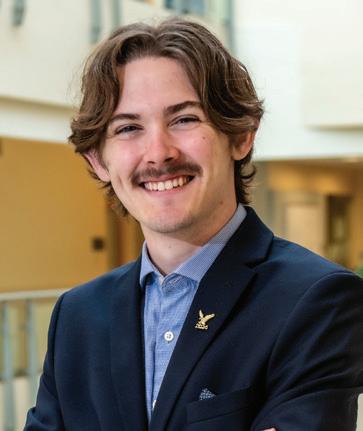
ogy, grounding it in the historical context of early scientific thought from figures like Galen, Hippocrates, and Aristotle, and the Latin/Greek terminology that forms the backbone of modern biological nomenclature. Simultaneously, studying biology provides insights into the dynamics of natural selection and species adaptation, topics that echo the transformative narratives found in classical texts. Together, these disciplines have equipped me with a comprehensive toolkit—ranging from technical empirical methods to analytical skills and a holistic perspective—that enhances my appreciation and understanding of the natural world.
What experience at BC had the most significant impact on you, and why?
Serving as UGBC president not only
the physical, to the spiritual and mental health. That reflective aspect of the University has been so important to me.
Beyond the friends that you have made, what will you miss most about BC?
The people and the opportunities. I feel like college is what you make of it. At the end of the day, you can choose what you do and who you surround yourself with. There are so many ways to bring meaning into your life right outside your door. It could be a class, or getting coffee at Hillside, just talking and building deeper-level connections. It’s a privilege to be in a place like BC and to be surrounded by these kinds of people and have these opportunities at hand to explore. I’m so grateful for the environment and the people here at BC.
What advice would you give to a new student?
Don’t be afraid to try new things and, especially, don’t be afraid of failing. You come in as a freshman and you have the whole world ahead of you. I keep a quote from Teddy Roosevelt’s “Man in the Arena” speech [see worldfuturefund. org/Documents/maninarena.htm]. It reflects how important it is to try. You are going to try over and over again, and you may fail over and over again. That has happened to me. The worst thing you can do is be afraid of failing. Every time I’ve failed, it has been so impactful to my college experience.
—Ed Hayward
taught me resilience and the importance of maintaining empathy under pressure, but it also honed my ability to balance work and life commitments effectively. As president, I carried the responsibility of representing the student body, acting as a crucial bridge between students and the administration. This position deepened my understanding of leadership as I received mentorship from predecessors and, in turn, mentored new members. The experience empowered me with a tough skin needed for negotiations and decision-making, while always staying grounded in the student community’s needs and perspectives.
What advice would you give to incoming BC students?
I often recommend journaling to all new students. It’s enlightening to see how your perspectives evolve throughout your college years, and reflecting on these changes as a senior can be incredibly rewarding. Take risks, but make sure they are calculated; this is how you’ll grow. Make it a priority to visit office hours and start building relationships with professors, faculty, and staff—these connections can blossom significantly over time. Also, while it’s important to be active and social, find your own quiet spaces where you can recharge. Balancing engagement with self-care will enhance your college experience immeasurably.
—Rosanne Pellegrini
May 9, 2024
5 Chronicle
photos by lee pellegrini
Sjah Honored as Aquino Scholarship Winner
BY PHIL GLOUDEMANS STAFF WRITER
Morrissey College of Arts and Sciences junior Hanan Sjah, whose own experience coping with personal grief has inspired her to pursue a career in pastoral counseling, is the winner of the 2024 Boston College Benigno and Corazon Aquino Scholarship.
Sjah was presented with the award by University President William P. Leahy, S.J., at the annual Aquino Scholarship Banquet on April 26.
Annually presented to a BC junior each spring, the scholarship recognizes a strong academic record, active engagement in Asian American issues, and service both on and off campus to the Asian American community. Sjah was selected from among a highly competitive pool of applicants that also included Kristen Kim, Patrick Kim, Kevin Tang, and Chloe Wu.
A double major in psychology and communication from Perrysburg, Ohio, Sjah serves as a MCAS Undergraduate Advising Fellow—a team of peer mentors who offer resources, such as advice on course registration, EagleApps, extracurricular involvement opportunities, academic planning, and transitioning to college—for students throughout the academic year. She also serves on the executive board for ASiAM, BC’s Asian and Asian American literary art magazine, and as the Muslim Student Association secretary.
Sjah’s career journey began with prelaw, but she switched to psychology as a sophomore, with the vision of becoming a therapist. Having endured the deaths of her parents—her mother while Sjah was in high school; her father last fall—she has more specifically focused on pastoral coun-
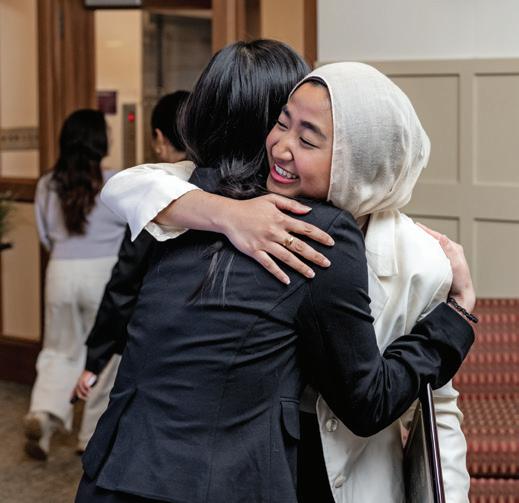
seling in a clinical setting. Next fall, she’ll begin a concentration in clinical psychology.
“I have long wondered how mental health services can be made more culturally competent and relevant for communities, and in my case the Muslim community. I have seen firsthand the demand for mental health support for adults; however, expecting therapy to be the only solution can be limiting and culturally ignorant.
“Grief informs my passion for mental health, and my exposure to illness and death contributes to my fervor for pastoral support,” she said. “As an aspiring hospital chaplain, I hope to use culture and religion to enlighten that way I support people through illness, bereavement, and crisis.”
As a member of the Southeast Asian Student Association, she was a freshman representative, and served as secretary as a sophomore. Sjah’s focus has been educa-
year’s recipient of the Benigno and Corazon Aquino Scholarship.
photo by caitlin cunningham
tion and history: She coordinated an event in collaboration with students of other cultures and faiths to demonstrate the religious diversity across Asia.
Sjah has long been involved in the Indonesian Muslim Society of America, the national religious and cultural nonprofit organization that serves the North American Indonesian Muslim community, and currently serves on its youth executive board. Since 2019, she’s coordinated the four-day program for young adults and teens at the annual Indonesian and Malaysian Muslim Conference.
“When I’m not planning for our conference, I’m on Zoom calls year-round, tackling the questions and concerns that pertain to the intersectional identity of being Southeast Asian and Muslim,” said Sjah. “With our Indonesian heritage, Muslim faith, and the mix of urban, suburban and rural upbringing in the United States, we’re
interested in efforts ranging from combating racism to finding the best hijab-friendly prom dresses.”
Sjah points to her first college essay—a response to the question, “What is the best way to live?”—as a defining experience: Her answer was the well-known saying of the prophet Muhammad, “Tie your camel and put your trust in Allah.”
“It encapsulates the balance we strike between our own efforts and our faith,” she said. “It’s no coincidence that the research I conducted and papers I wrote in courses across psychology and communication would explore the way religion and culture influence how we live.”
Assistant Professor of Romance Languages and Literatures Wan Sonya Tang noted that Sjah was the Aquino Scholarship committee’s unanimous selection as this year’s winner.
“While her written application and essay were compelling, what really blew us away was her interview. She was poised and polished, but extremely humble. We loved how readily she accepted that she did not have all the answers, and that she was still learning and improving.”
Tang added that Sjah was quick to credit her own mentors such as Academic Advising Center Assistant Director Helen Ha, and how they had helped her to grow into her leadership potential.
“We were most struck by her overwhelming positivity despite the challenges she has faced, and how she has truly tried to build and uplift the Asian Muslim community at BC and nationwide,” said Tang. “She is exactly the kind of student that the Aquino Scholarship is meant to honor, and we are extremely excited to see what she does next year and where she goes after graduation.”
Visit Highlights University’s Ties with the Philippines
BY KATHLEEN SULLIVAN STAFF WRITER
Boston College recently hosted a delegation of nearly 20 lawmakers and higher education officials from the Philippines who visited the United States as part of a higher education learning exchange. The Filipino delegation received an overview on how the University and institutions in the Philippines are connecting and about future endeavors involving students and faculty.
The visitors included Senator Juan Edgardo Angara, Senator Sherwin Gatchalian, Ateneo de Manila University President Roberto C. Yap, S.J., and University of the Philippines President Angelo Jimenez.
“Boston College has an enduring relationship with higher education in the Philippines, especially the Ateneo de Manila and the Ateneo de Cagayan,” said Vice Provost for Global Engagement and Canisius Professor of Theology James F. Keenan, S.J. “It was a pleasure to welcome our great friend, Bobby Yap, S.J., and our other esteemed guests.”
During the delegation’s campus visit
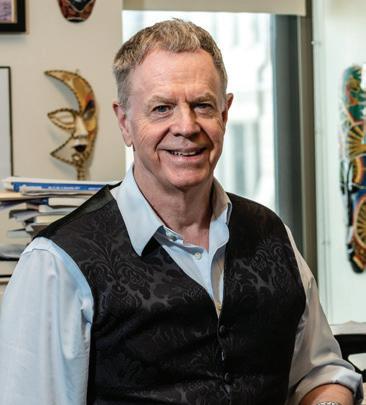 photo by lee pellegrini
photo by lee pellegrini
on April 17, a panel of BC faculty and administrators discussed initiatives and programs connected to universities in the Philippines.
Professor Glenn Gaudette, the John W.
Kozarich ’71 Chair of the Department of Engineering, noted that he will bring 12 BC engineering students to the Philippines in July. The cohort will collaborate with a group from Ateneo de Manila University on a local engineering project and also work on water supply issues in neighboring regions.
Professor Brian K. Smith, Honorable David S. Nelson Chair at the Lynch School of Education and Human Development, discussed joint work between the schools of education at BC and Ateneo de Manila University.
“The Ateneo de Manila school of education and our Lynch School have extensive connections,” noted Fr. Keenan, who also directs BC’s Jesuit Institute. “We look forward to the same type of collaboration in engineering and to faculty exchanges between our schools of theology and ministry.”
Connell School of Nursing Dean Katherine Gregory talked about the partnership between BC’s nursing school and Xavier University-Ateneo de Cagayan College of Nursing, which signed a memorandum of
understanding in 2022.
Other BC panelists included Vice Provost for Faculties Billy Soo, Vice President for Institutional Research and Planning Mara Hermano, and Larry Pickener, director of the Office of Global Education, who shared data on BC students studying in the Philippines as well as Filipino students studying at BC.
Fr. Keenan said he, Ateneo de Manila School of Law Professor Alu Dorotan, and BC Law Associate Clinical Professor Evageline Sarda are exploring relationships involving the law schools.
Dorotan is a member of the Climate Change & Migration working group of BC’s Program on Global Ethics and Social Trust. She was recently in Washington, D.C., to take part in meetings with President Joe Biden and Philippines President Ferdinand R. Marcos Jr.
Fr. Keenan, along with Executive Director of Global Engagement Bryan Fleming, organized the BC visit, which concluded with a tour of the Chestnut Hill campus led by Hermano and Andrew Kolebuck ’25.
May 9, 2024
Hanan Sjah ’25 receives congratulations after being named this
James Keenan, S.J.: “Boston College has an enduring relationship with higher education in the Philippines.”
6 Chronicle
Thomas Wangler; Taught Theology for Four Decades
Thomas E. Wangler, a retired associate professor of theology who taught at Boston College for 44 years and was active in faculty governance, died on April 24. He was 85.
Dr. Wangler, who specialized in the history of religion in America and American Catholicism, was director of the Theology Department’s Graduate Studies Program. He also served as associate dean for students in the College of Arts and Sciences from 1972-1974.
Among his publications were a pair of articles, both published in Harvard Theological Review, that dealt with Americanism, a modernist, liberal political and religious outlook attributed to some late19th-century American Catholics that led to conflict within the Catholic Church and was denounced as heresy by the Holy See.
A summary of one Dr. Wangler article, “The Birth of Americanism: Westward the Apocalyptic Candlestick,” explained that “a faith or myth was born alongside the standard Catholic orthodoxy of the period, one which affirmed God as rearranging the world, determining the decline of Europe and the emergence of the United States of America as a ‘New World,’ destined, as in the puritan dream, to shed its influence around the world. The unique features of this American Catholic reinterpretation of the puritan myth were that it was housed within an international religious institution, and its object was not exactly the spread of political liberty or a purified Christianity, but a modernized or Americanized Catholicism.”
“The Birth of Americanism” received an award from the College Theology Society in 1973.
Dr. Wangler also contributed “American Catholics and the Spanish-American War” to the volume Catholics in America: 1776–1976.
A hallmark of Dr. Wangler’s BC career was his participation in faculty governance and other administrative work. Over the years, he served on the Faculty Due Process Committee, Faculty Hearing Committee, Faculty Review Panel, Faculty Compensation Committee, and Faculty Grievance Committee, among others. In addition, he was a member of the A&S Educational Policy Committee, and directed the school’s Scholar of the College Program. He also served on the planning committee for the University’s 125th anniversary celebration in 1988.
Dr. Wangler showed a willingness to broaden his approach to teaching when during the 1992-1993 academic year he participated in a series of seminars on applying the case method—most often associated with management and business education—to disciplines in the liberal arts and humanities. Speaking with Boston College Chronicle, Dr. Wangler said the large number of students in his classes seldom offered an opportunity for a discussion
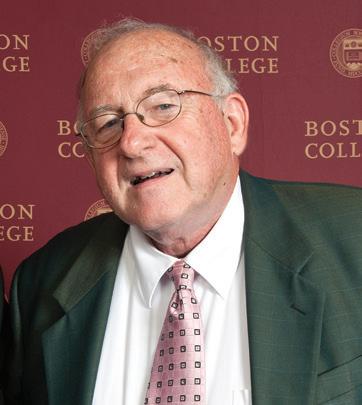
format.
“Consequently, I haven’t developed many skills in leading classroom discussion,” he said. “I thought, however, that it would be a good thing to learn and so far I’ve enjoyed the seminars very much.”
Dr. Wangler occasionally shared his expertise with the media, discussing the first year of then-Archbishop Sean O’Malley, OFM, Cap., as head of the Archdiocese of Boston in an interview with the Associated Press, and commenting on the evolution of Cardinal Bernard Law’s leadership style for a story in the Boston Sunday Globe.
His proficiency as a religious historian was once put to use in an extraordinary circumstance: as an expert witness in the trial of John Salvi, accused of killing two women and wounding five other people in shootings at two Boston area abortion clinics in 1994. Dr. Wangler was called by the defense to reinforce its assertion that Salvi was experiencing paranoid schizophrenic delusions, claiming among other things that Freemasons were running abortion clinics as part of a plot to reduce the number of Catholics, reported The Boston Globe
Dr. Wangler testified that while the Roman Catholic Church and the Freemasons had been at odds for centuries, there was no conspiracy on the part of the Freemasons toward Catholics.
“I have never seen a Catholic express the opinion that Masons were conspiring to get rid of Catholics,” he said, according to the Globe
Dr. Wangler graduated from LeMoyne College in 1960, leaving behind an impressive legacy of eight intercollegiate athletic trophies he won in cross-country; in 1990, he was inducted into LeMoyne’s Gold Wave Athletic Hall of Fame. He received a doctorate in religious history from Marquette University.
He retired from BC in 2011.
Dr. Wangler is survived by his children Julie Anne Belou and John W. Wangler; granddaughter Alexandra; three step-grandchildren and seven step-great-grandchildren; siblings Paul, Ann, Mary, and David. He was predeceased by his wife, Gail, and sister Joan. Interment was private.
Memorial contributions can be made in his memory to the Office of Campus Ministry/Newman House, Boston College, McElroy 233, 140 Commonwealth Ave., Chestnut Hill, MA 02467. To send a note of condolence or to share a memory with his family, go to www.eatonandmackay.com.
—University Communications
BC One of the ‘New Ivies’
Continued from page 1
and Integrated Learning Joseph Du Pont. “This designation underscores our commitment to fostering an environment where academic excellence and career preparation go hand in hand.
“Our Jesuit tradition of educating the whole person is fundamental, encouraging our students to pursue work that is not only meaningful but also impactful, preparing them to make a positive difference in the world. Our students are equipped not just with knowledge, but with the adaptability and drive that today’s dynamic job market demands.”
Forbes surveyed nearly 300 subscribers to its “Future of Work” newsletter, 75 percent of whom possess direct hiring authority. According to the magazine, “33 percent of those making hiring decisions said they are less likely to hire Ivy League graduates today than five years ago. Only seven percent said they were more likely to hire them.”
Entrepreneur, “Shark Tank” investor, Dallas Mavericks owner, and Indiana University alum Mark Cuban noted in the Forbes article: “I don’t give an edge to Ivy League schools. That’s not to say that I wouldn’t hire one. It’s just that I never believed they make better employees.”
To determine their “private and public Ivies” list, Forbes’ researchers first disqualified the “Ancient Eight” (Brown, Columbia, Cornell, Dartmouth, Harvard, Penn, Princeton, and Yale) along with what it characterized as commonly accepted “Ivyplus” universities such as the University of Chicago, Duke, MIT, and Stanford—resulting in 1,743 colleges with at least 4,000 students for their survey.
Using 2022 admissions data, they screened for colleges with high standardized test scores—schools that still heavily rely on objective measures of success—and where at least half of the applicants sup-
Jobs
The following are among the recent positions posted by the Department of Human Resources. For more information on employment opportunities at Boston College, see www.bc.edu/jobs or scan the QR code at right.
Service Center Representative
Associate Director, Student Governance and Leadership
Design and Prototyping Manager
Report Developer
Temporary Office Pool
Food Service Worker
Fiscal and Events Specialist
Public Safety Dispatcher
Academic Support Assistant
Concert Manager
Dishwasher
Special Education Teacher
Director, Human Neuroscience Facility
plied their scores, whether required or not. Their focus on SAT or ACT results was based on findings from the nonprofit research firm Opportunity Insights, which demonstrated that standardized test assessments are “both more predictive of success in college than grades, and fairer to all applicants,” the article noted.
The researchers also screened the schools with a selectivity measure (below a 20 percent admission rate at private schools and 50 percent at public universities), resulting in 32 colleges remaining for the hiring manager respondents to assess.
Forbes reported that 31 percent of the hiring managers thought that non-Ivy private universities like BC were doing a better job of preparing job candidates, while 37 percent praised state universities for their students’ preparedness.
According to the magazine, the Ivies have “taken the value they’ve spent centuries creating—a degree that employers craved—and in just a few years done a lot to forfeit it.”
The state universities identified by Forbes as “public Ivies” included Binghamton University, Georgia Institute of Technology (main campus), University of Texas-Austin, University of Florida, University of Illinois Urbana-Champaign, University of Maryland-College Park, University of Michigan-Ann Arbor, University of North Carolina-Chapel Hill, University of Virginia (main campus), and the University of Wisconsin-Madison.
While Forbes readily admits that the Ivy League schools haven’t completely “lost their luster,” Jacqueline Reses, a Penn alumna, donor, and member of Wharton’s Board of Advisors, told the magazine, “I wouldn’t forego the opportunity to hire brilliant, tenacious, smart wonderful kids, but I’d be more thoughtful in how I’d screen them.”

Patrol Officer
Associate Director, Student Financial Systems
Consulting Dietician, Pediatrics
Housing Assignments Specialist
Area Coordinator, Office of Residential Life
Assistant/Senior Assistant/Associate Director, Undergraduate Admission
Assistant Coach, Women’s Ice Hockey Director, Sponsored Programs
May 9, 2024
OBITUARY
photo by lee pellegrini
7 Chronicle
BC Research
Trio Studies Pot Legalization, Teens’ Substance Abuse
BY PHIL GLOUDEMANS STAFF WRITER
Recreational cannabis legalization has passed in nearly half of the United States since 2012, and retail sales of the products have risen, but a new study by Boston College researchers finds no evidence that these two factors have contributed to a net increase in substance use among adolescents in the U.S.
The results, utilizing the most recent data on adolescent substance use to evaluate the effect of recreational cannabis legalization and retail sales on youth’s use of cannabis, tobacco, and alcohol, were reported in the Journal of the American Medical Association (JAMA) Pediatrics. [The article is available at jamanetwork.com/journals/ jamapediatrics/article-abstract/2817566]
The study’s authors—co-principal investigators Rebekah Levine Coley, a Lynch School of Education and Human Development professor; School of Social Work Professor Summer Sherburne Hawkins; and Economics Professor and Chair Christopher F. Baum—are among the first to evaluate associations between recreational cannabis legislation and recreational cannabis retail sales through 2021.
“Although studies of early-enacting states and Canada reported few effects of recreational cannabis legislation on adolescent substance abuse, experts have highlighted the need to further assess policy outcomes in youth as legislation and retail availability spread, and other policies targeting youth substance use shift,” the authors wrote. “We found limited associations between recreational cannabis legalization and retail sales with adolescent substance use, extending previous findings.”
The researchers analyzed data from nearly 900,000 high school students in 47
John West
Continued from page 1 Team captain.
The honor resounded deeply for West, a Shrewsbury, Mass., native and communication major who has a very personal experience with ALS: His father fought a four-year battle with the degenerative disease before passing away in 2014. Since then, West has devoted time and energy to spreading awareness, raising funds, and making an impact on the lives of those affected by ALS.
“I hadn’t been expecting it and I really didn’t know exactly what it meant until that moment,” recalled West recently. “It was really cool to share the moment with Todd and Sull, especially having met Boog knowing how passionate he is about the cause.”
On April 25, West and his BC teammates played their 12th annual ALS Game at Fenway Park in collaboration with the Boston Red Sox. It’s an event the Eagles look forward to every season for reasons
states over a 10-year period between 2011 and 2021.
Since 2012, 24 states and Washington, D.C., enacted recreational cannabis legislation, and 18 states implemented recreational cannabis sales.
According to the researchers, recreational cannabis legalization was associated with modest decreases in cannabis, alcohol, and e-cigarette use, while retail sales were associated with lower e-cigarette use, and a lower likelihood—but also increased frequency— of cannabis use among youth consumers, leading to no overall change in cannabis use.
“The results suggest that legalization and greater control over cannabis markets have not facilitated adolescents’ entry into substance use,” noted the co-authors.
According to the Pew Research Center, 54 percent of Americans live in a state where the recreational use of marijuana is legal, while 74 percent of Americans live in a state where marijuana is legal for either recreational or medical use. Also, 79 percent of Americans live in a county with at least one cannabis dispensary; as of February 2024, there are nearly 15,000 dispensaries operating in the U.S.
Discussing the study recently, Coley said its results were not particularly surprising, given that they extended prior research by the team and others finding limited associations between recreational cannabis legislation and adolescent cannabis use.
However, she added, “given other evidence that recreational legalization has increased access to cannabis and been linked with increased use and problematic outcomes among adults, it is quite interesting that these patterns have not extended to adolescents. Teens are not legally allowed to purchase under the new laws, suggesting perhaps that legal sales are not increasing
that some, like West, would call powerful and important. “We Play for Pete” is the slogan associated with BC’s ALS Game, in memory of former BC baseball captain
Pete Frates ’07, whose heroic battle with ALS served as the inspiration for the Ice Bucket Challenge that has helped raise an estimated $220 million worldwide for ALS research.
Created by the Live Like Lou Foundation in partnership with Phi Delta Theta, the Community Impact Team also included players from Georgia Institute of Technology, Louisiana State University, Ripon College, Vanderbilt University, Wake Forest University, Wayne State University, Union College (Ky.), and the University of California-Berkeley.
As part of his captainship award, West was given $4,000 to support a local family affected by ALS. Prior to the ALS Game, West was recognized for his Community Impact Team captainship, and—thanks to assistance from Phi Delta Theta, the Live Like Lou Foundation, PerMobil, and Numotion—West presented ALS patient
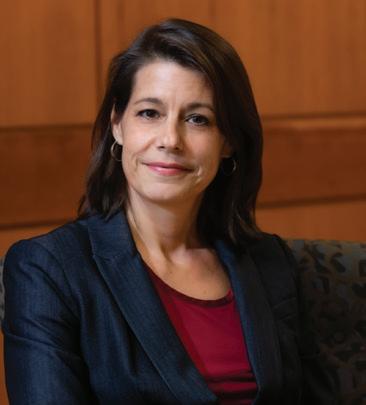
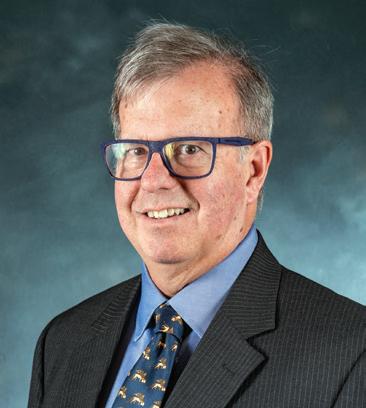
access to under-age adolescents in the same manner as increased access for adults.”
Coley said parents, educators, and other adults would likely find comfort in the fact that evidence to date does not find increased adolescent use of cannabis—or of other substances due to spillover or substitution effects—following recreational cannabis legalization.
“Given the potential risks of early entry into cannabis use, including mental health repercussions, other substance use as well as substance abuse, this is indeed good news,” she said. “We did identify one pattern of concern that is important to continue to track, however: the suggestion that, following enactment of recreational cannabis commercial sales, youths using cannabis were doing so more frequently. As public views of the safety and accessibility of cannabis continue to evolve, along with potential legal repercussions of cannabis pos-
Jim Duhammel a state-of-the-art, motorized BC-branded wheelchair.
Frates’ sister Jennifer Mayo ’04 paid West the ultimate compliment in an interview with ACC Network: “Pete is personified in Johnny. You meet him and he has that same vibrant energy, that spirit, and that aura around him. He is such a kindhearted soul.”
West is gratified at the increased public awareness of ALS. It was a different story when his father was battling the disease.
“I remember when nobody knew or understood what ALS was,” he said. “Then all of a sudden, Pete Frates comes out with the Ice Bucket Challenge with Pat Quinn”—a friend of Frates who had also been diagnosed with ALS—“and now everyone in the world knows what ALS is. It’s incredible.”
West’s service activities have included Team Impact, a program that helps place children with disabilities and illness with sports teams, the ALS Charitable Foundation, and the Pete Frates Foundation. West is also a volunteer for BC’s Youth Little League Day and Brighton’s Main Street
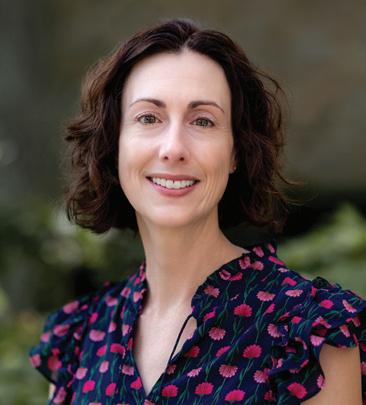
session and use, it is important to continue to evaluate repercussions for adolescent substance use and well-being.”
Researchers who contributed to the study included Naoka Carey, a doctoral candidate in the Applied Developmental and Educational Psychology Department of the Lynch School; and Claudia Kruzik, a postdoctoral research associate at the University of Maryland-College Park.
Business Trick or Treat, and is a Welles Crowther Red Bandanna number 19 patch recipient—an honor given annually to a player from each of BC’s sports teams who best personifies the motto “men and women for others.”
West is gladdened by the progress against ALS, but feels there is still much work to be done, and his dedication to the ALS community will continue to persevere. He hopes to play baseball professionally and to leverage that platform to continue spreading awareness of ALS and support for those affected by it. After all, as West says, “this is baseball’s fight to win.”
Meanwhile, as he nears the end of his undergraduate years at the Heights, he is grateful for those who have had such a positive impact on his BC experience.
“This is a really special place full of special people, and what they say about BC is true: It’s a place of men and women for others. I think that’s what I’m going to take with me from my time at Boston College.”
May 9, 2024
Clockwise from above left: Rebekah Levine Coley, Christopher Baum, and Summer Sherburne Hawkins
photos by lee pellegrini peter julian caitlin cunningham
8 Chronicle












 photo by lee pellegrini
photo by lee pellegrini




